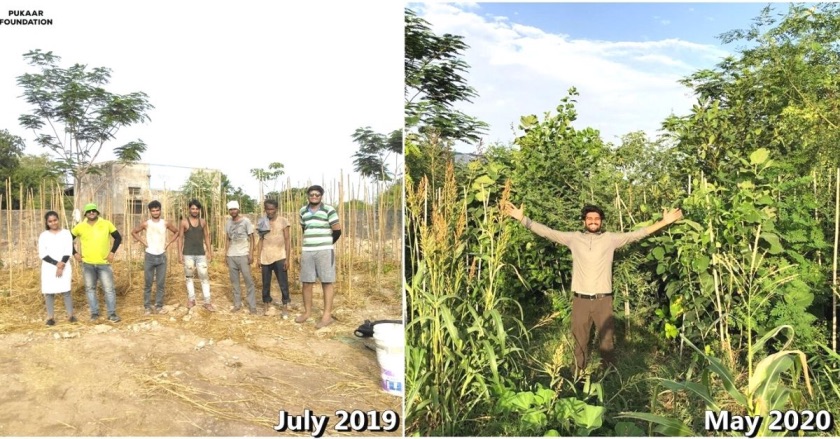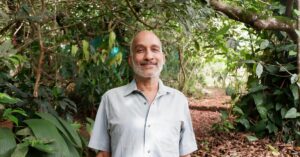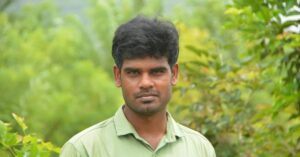26-YO Creates 8 Miyawaki Forests on Dry Land, Helps 1200 Farmers Boost Their Income
Bhuvnesh Ojha from Rajasthan has planted over 26,000 plants to create Miyawaki forests, and subsequently help 1,200 farmers increase their income through horticulture

Rajasthan makes up 62 per cent of all the arid and desert areas across the country, contributing to the maximum portion of land desertification. Factors including change in the use of land, as well as soil erosion and degradation, have only made matters worse.
Having lived amid the Aravali Hills his whole life, Bhuvnesh Ojha, a resident of Peeplond village in Udaipur, learned very quickly how this was affecting the lives in his village.
“I was in Class 8 when I realised that the villagers were struggling for water. Conflicts would often erupt among locals, who would try to get the maximum share of the precious resource whenever the water tanker arrived. Moreover, I also learned about how water shortage and poor soil health contributed to reducing farmers’ income, resulting in suicides,” he tells The Better India.
The 26-year-old says that during peak summer months, villagers often migrated to cities seeking work opportunities. “On some occasions, we read the news about cases of theft and burglaries increasing due to poverty or lack of livelihood,” he says.
To change the picture in the village, Bhuvnesh has created green oases in the village and helped hundreds of farmers improve their livelihood through horticulture.
Spending from his pocket money

Bhuvnesh approached his grandfather to express his concerns about the worsening state of the village. “I asked him whether such poor living conditions had always existed in the village, and how people had lived in such dire state for years.”
Bhuvnesh’s grandfather said the situation was far better when he was young, as there used to be a forest about 500 meters away from the village. The wildlife often shared spaces and forest resources with the locals, but eventually, this all disappeared.
“Uncontrolled tree cutting and exploitation of the forest had led to the destruction of forest and disappearance of wildlife habitat. As the trees and green cover disappeared, the groundwater table depleted, wells dried, and water scarcity began. The water shortage affected agriculture activity and the overall income of the farmers,” he explains.
Bhuvnesh says that school taught him how forests play a crucial role in maintaining the ecosystem. “Forests can prevent soil erosion, hold water and increase groundwater table and allow other biodiversity elements to thrive,” he says.
So he decided to pursue a graduate degree in engineering via Indian Institute of Technology (IIT), bag a well-paying job, and use the money to build forests around his village to help the residents over the next 15 years. He even moved to Kota in Rajasthan to seek coaching for his academics. However, an incident made him rethink his decision to continue his studies.
“I read a quote in a biography that said ‘live as if you will die tomorrow’. The words touched me, and I felt that if I did not take up the cause sooner, my dream to increase the green cover would probably never materialise,” Bhuvnesh says.
So he quit coaching and returned to his village to start seeing his dream through. “The first mango sapling I planted was on 10 March 2013. Since then, I have planted thousands of trees to create green pastures,” he says.
Bhuvnesh started planting trees in government and publicly owned spaces. “I found government offices or lands that were available for plantation and posted pictures on Facebook. Eventually, people were inspired and joined the cause,” he says.
As the demand for resources for his initiative increased, he formed the Pukaar Foundation in November that year.
“I used to put my savings and pocket money into the plantation drives. But the senior volunteers suggested I pool in financial resources for the work, and the community needed structure, discipline, and accountability,” he says.
Since then, Bhuvnesh and thousands of volunteers have planted eight dense Miyawaki forests in and around Udaipur, including his village. The forest growing technique involves planting native plant species in density that enables speedy growth within two to three years.
“The forest differs in sizes, depending on the land availability, but the smallest is about 100 square feet, and biggest is 6,000 square feet. These green patches have 26,000 trees that are now home to reptiles, birds, butterflies and other creatures,” he says.
Bhuvnesh says that the volunteers meet every Sunday and dedicate hours for the maintenance and upkeep of the saplings. “We water the plants, ensure healthy growth of the plantations, and identify new places,” he says.
There are 15 public parks where native trees have been planted to increase the green cover. However, in recent years, Bhuvnesh has realised the need for safer land and to ensure the plantations benefit farmers at large.
Ultimate aim to end water woes
“After the first wave of COVID-19 lockdown, we identified 1,200 farmers and provided them with 15,000 custard apple plants. Such a move would help the farmers with additional income and also ensure the saplings are protected and maintained at all times,” he says.
Bhuvnesh has also started appealing to farmers to take water conservation works under Mahatma Gandhi National Rural Employment Guarantee Act (MNREGA) by digging trenches. “Every trench has two saplings planted in them. It will help the water percolate during rains and assist the saplings in their growth. The roots of the saplings will retain water when they mature and help increase the groundwater levels,” he says.
Bhuvnesh says that recently, he provided 4,000 saplings of fruit varieties of mango, gooseberry, custard apple, jamun, guava, lemon, pomegranate and bamboo to 140 farmers. “They will grow the plants and later process the fruits to start a food processing unit. Horticulture will supplement and multiply their income,” he says.
Hiralal Meena, a farmer from Alasigarh, says he has planted four guavas and 18 jamun saplings on the farm. “The fruits from the trees will be an additional source of livelihood. Besides, the mini forest near the village has become a micro-climate zone and offers cool air in the vicinity,” he says.
Hiralal says that the tree plantation through organic methods has reduced the proportion of chemicals in the soil and increased the carbon content. “The NGO had conducted a test, and the results were commendable. The texture and quality of the soil in the plantation areas has certainly improved,” he adds.
Bhuvnesh says that all the saplings planted are documented and geotagged with the coordinates. “It helps monitor the plant and species placed in each area. Moreover, we are now identifying rare and medicinal plants with the help of locals. Many varieties are becoming rare, but they are crucial for primary healing and treatment used by locals for centuries. Our efforts are now to document them and create a nursery for its future conservation,” he says.
Bhuvnesh says that among all his efforts, seeking funds and creating on-ground impact were the most challenging bit. “Many of us want to have a greener and cooler planet, but there are few to take the required action. It is difficult to identify, encourage and motivate people to take that step. Also, environmental conservation is a slow process as nature takes its course. Hence, patience is a value to learn and practice while working for the cause. There cannot be immediate results, and sometimes it is hard to convince the donors about the same,” he says.
Bhuvnesh hopes that his efforts help reduce farmer suicides and increase water availability in the region. “My dream will only come true when the water crisis for farmers and villagers ends,” he adds.
Edited by Divya Sethu
This story made me
- 97
- 121
- 89
- 167
Tell Us More
We bring stories straight from the heart of India, to inspire millions and create a wave of impact. Our positive movement is growing bigger everyday, and we would love for you to join it.
Please contribute whatever you can, every little penny helps our team in bringing you more stories that support dreams and spread hope.



















